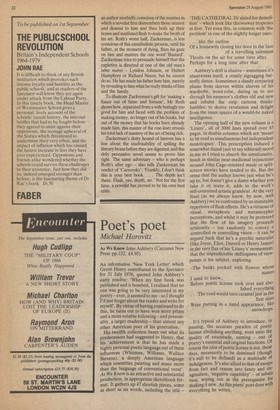Imperilled
Francis King
Zuckerman Unbound Philip Roth (Cape pp. 225, £5.95)
It is as natural that a novelist should feel impelled to write about his art as that an adolescent suffering from acne should feel impelled to squeeze his spots. In each case, there is the desire to milk an over-riding preoccupation. But except to those that share that over-riding preoccupation, the result is unlikely to be of enormous interest.
Philip Roth, an American Jewish novelist who became famous with a novel, Portnoy's Complaint, about onanism, writes about an American Jewish novelist, Nathan Zuckerman, who has become famous with a novel, 'Carnovsky', about onanism. Zuckerman/ Roth sees every writer as having to clear two obstacles in his relationship with the public: first, there is indifference and then, if he is lucky, there is attention. But the kind of attention that a Zuckerman/Roth is accorded in the States is clearly different from that which his equivalents are accorded over here.
I doubt whether, on his visits to this country, even Graham Greene suffers the kind of intrusions into his private life that are inflicted on Zuckerman/Roth in New York. Strangers point out 'the Jewish Charles Dickens' to each other and even address him; celebrities as various as Trudeau, Abba Eban and Yves St Laurent seek out introductions; Jews send him vituperative letters because of the shamelessness with which he has traduced the Jewish family and Gentiles send him invitatory ones because of the candour with which he has written of his hero's sexual hang-ups. Like many other people catapulted into fame, he begins to realise that, as he himself puts it, the Hallelujah Chorus may not be an entirely unalloyed pleasure from beginning to end. But to sympathise with his predicament is difficult for the English reader or even for the English novelist. Ours, after all, is a country in which few meter-readers read anything but meters and few bookies buy books; and in which the only writers likely to be recognised in a street are Melvyn Bragg and Barbara Cartland.
To achieve fame in the United States is, of course, increasingly to risk assassination; and when a famous writer like Zuckerman/Roth is confronted with a semi-literate psychopath squinting down the barrel of a sawn-off shot-gun, it is vain, as he himself acknowledges, for him to plead that he has been a useful member of PEN. 'Blowing people apart seemed to have replaced the roundhouse punch in the daydreams of the aggrieved', the apprehensive novelist meditates, as he reminds himself of the case of the dim, bachelor teacher of Middle English at the University of Chicago, who was shot at while sitting at his kitchentable with a glass of warm milk and a Wodehouse novel ('His course had been hard, though not that hard').
So it is that Zuckerman has come to attract the attentions of a crackpot, formerly a prize-fighter and a marine and now a would-be writer, who smarts from two festering wounds. Firstly, as the prodigy of a Sixties Quiz Show, the counterpart of the real-life Sixty-four Thousand Dollar Question', he was cheated out of continuing victory by a WASP rival, the counterpart of the real-life Mark Van Doren, to whom the Jewish producers of the show had been surreptitiously feeding the answers. Secondly, in writing of onanism in`Camovsky', Zuckerman has stolen from him the dominant theme of his own existence. Whether this bizarre character, the most original in the novel, must be identified with the anonymous caller who threatens to kidnap Zuckerman's mother or to assassinate Zuckerman, the inconclusive ending never makes clear; but Zuckerman is frightened enough to envisage the newspaper headlines— in the first case, PUG TRItEATENS PORN mom, and in the second, JERK-OFF ARTIST KILLS BARD JERKING-OFF.
Mr Roth has long since proved himself to be a highly witty and intelligent writer, so that it is not surprising that this new novel should be crammed with good jokes and penetrating observations of life and fiction. Clearly, here is an author morbidly conscious of the manner in which a novelist first dismembers those nearest and dearest to him and then boils up their bones and mutilated flesh to make the broth of his art. Roth's worst half, Zuckerman, is less conscious of this cannibalistic process, until his father, at the moment of dying, fixes his gaze on him and mutters the one word 'Bastard'. Zuckerman tries to persuade himself that the expletive is directed at one of the old man's betes noires — Lyndon Johnson, or Hubert Humphrey or Richard Nixon; but he cannot do so. He has made his father hate him, merely by revealing to him what he really thinks of him and the family.
To illustrate Zuckerman's gift for 'making a fiasco out of fame and fortune', Mr Roth shows how, separated from a wife boringly too good for him and faced with the problem of making money, no longer out of his books, but out of the money that his books have already made him, this master of the one-liner reveals his total lack of mastery of the art of being rich.
Zuckerman's dotty hound of heaven has a line about the inadvisability of spilling the literary beans before they are digested; and this drily percussive novel seems to prove him right. The same adversary — who is perhaps Roth's alter ego — also tells Zuckerman his verdict of `Carnovsky'; 'Frankly, I don't think this is your best book. . . . The depth isn't there. Flash, yes; depth, no.' Not for the first time, a novelist has proved to be his own best critic.



































 Previous page
Previous page